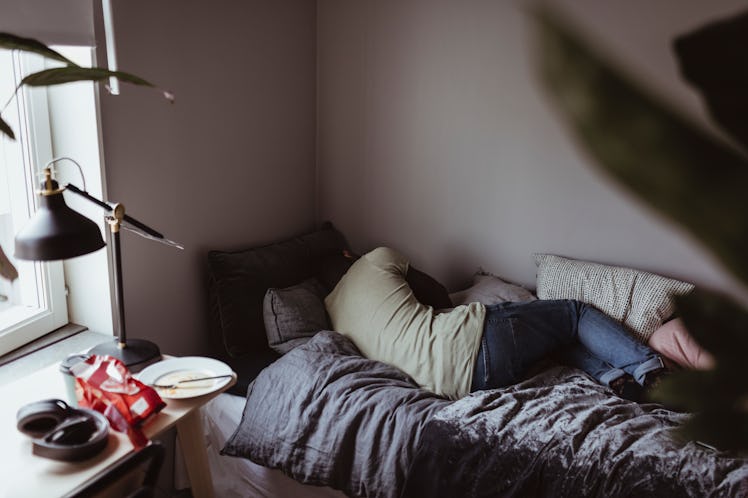What Happens To Your Body When You Don't Get Enough Light
The dark time of year has some serious implications for your mind and body. Here’s exactly what’s happening — and how to reverse it.

It’s that time of year again: The days are so short that you barely get any daylight outside of work hours. By the time you clock out, it’s already dark, and you’d rather saddle up on the couch than hit the gym. To make matters worse, you’re craving comfort foods that will only add to your waistline. It’s also the time of year when many of us are hit with seasonal affective disorder (SAD), a type of depression that occurs when you don’t get enough light. So how exactly does the lack of light translate into all of these issues?
The eyes have receptors that contain special cells called melanopsin that detect natural light, explains Paul Desan, M.D., Ph.D., director of the Winter Depression Research Clinic at Yale Medical School. Based on this, these cells send messages to a tiny region of the brain called the suprachiasmatic nucleus (SCN). Based on how much natural light melanopsin senses, the SCN sends out different messages that control emotions and sleep cycles.
In the wintertime, the eyes detect less light, which causes the SCN to secrete more melatonin, adds Paul Nestadt, M.D., an assistant professor of psychiatry at Johns Hopkins University. This excess melatonin is part of the reason that during the winter months we’re less active, crave heavier foods, and want to sleep all the time.
Increased melatonin production is also linked to SAD and symptoms of depression in humans. “It’s a lot like how hibernation works in animals, but since humans have a more complicated brain or cortex, it also applies to our mood,” says Nestadt.
There’s likely an evolutionary reason for this, Nestadt says. In the wintertime, it would have been harder to get food, so we would have spent more time sleeping. When we did eat, our appetites would have been heartier. But the unintentional side effect is that the high amount of melatonin also slows down our mood, which in some people can lead to sadness and depression.
Levels of serotonin may also play a role, but the research is controversial, and Desan says that lower levels of the neurotransmitter don’t necessarily correlate with poor mood. There’s no neat scientific theory that reflects the changes in mood come winter, he says. “It’s not like one chemical dries up and causes depression.”
The latitude where you live makes a big difference in how this dark time of year affects you since it impacts variations in the light/dark cycle, says Desan. The further you get from the equator, the more likely you are to be affected by the seasons. “Just like bears hibernating for winter, humans are seasonal,” he says.
Around 3% to 5% of people living at Mid-Atlantic latitudes (in places like Virginia, Connecticut, and New York) have severe symptoms of depression in the wintertime because of a lack of light, says Desan. Incidence can get as high as 10% in the Northern portions of the country. And as many as 15% of those living at Mid-Atlantic latitudes experience mild darkness-related symptoms, including increased appetite, weight gain, and sleepiness.
Treating the Winter Blues
Although SAD is a widespread condition, Desan says, it’s relatively simple to treat. A wide body of research has shown that sitting in front of a 10,000 lux light for 30 minutes each morning during the winter months can significantly reduce symptoms. When light hits the ocular system, it slows down the production of melatonin, which can increase wakefulness, slow appetite, and make us to feel less sluggish. Just make sure you obtain a light box powerful enough — because many of them sold on the internet are too weak to have an impact.
Vitamin D supplementation has not, unfortunately, been shown to help with SAD. Still, a vitamin D deficiency — which occurs in 35% of Americans — can have other unrelated side effects such as fatigue, poor immune function, heart problems, and muscular and joint pain. If you’re experiencing any of these symptoms, it might be worth getting your levels checked and supplementing as necessary.
You can also fight the hibernation mindset by exercising (even when you don’t feel like it) and getting out with friends and family. Medication-based treatments like Wellbutrin have also been shown to be effective for treating SAD. And if none of that works, move to Florida.